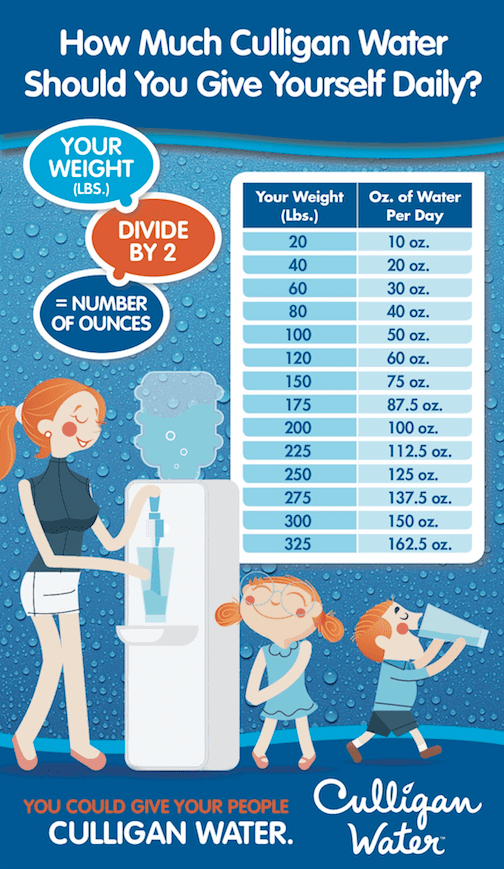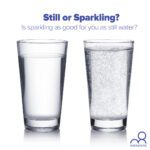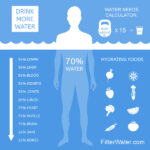Overview of the “Cardinal Rule”
The “cardinal rule” of drinking water is something that has been around for many years. The saying is that adults should drink six to eight 8-ounce glasses of water per day. While there is no scientific evidence to back up this rule, it has become a widely accepted recommendation. However, the Institute of Medicine (IOM) is the organization that actually sets the recommended daily water intake for adults. The IOM recommends that men drink 3.7 liters (about 15 cups) of fluids and women drink 2.7 liters (about 11 cups) of fluids per day, which includes water, juice, tea, coffee, and other beverages. This recommendation also includes foods that contain water, such as fruits and vegetables.
How to Divide the Goal
In addition to the “Cardinal Rule” of drinking half your body weight in water, the Institute of Medicine recommends that adults should drink 11.5 cups (2.7 liters) of fluids a day for women, and 15.5 cups (3.7 liters) for men. To simplify this recommendation, you can aim to consume half an ounce for every pound of body weight. To do this, divide your body weight in half and aim to drink that amount in ounces of water each day. For instance, if you weigh 175 pounds, you should aim to drink 87.5 ounces of water a day.
Suggestions for Different Age Groups
For adults, the Institute of Medicine of the National Academies recommends drinking 2.7 liters (or 91 ounces or 11 cups) of water per day. However, depending on age, the recommendation may vary. For example, children ages 1 to 3 years need approximately 4 cups of beverages per day, including water or milk, while children aged 4 to 8 years should have 7 cups per day of total water. But what about pregnant women? Let’s take a look at how much water a pregnant woman should drink.
How Much Water Should a Pregnant Woman Drink?
For pregnant women, the recommendations can be a bit more specific. The American College of Obstetricians and Gynecologists (ACOG) and the Institute of Medicine recommend that pregnant women drink on average ten 8-ounce glasses of water per day. This is slightly higher than the general recommendation for adults, as the extra water helps support the growth and development of the fetus. Keep in mind, too, that about 20 percent of your daily water intake comes from food sources. Fruits pack the most water: one cup of watermelon contains about 1.5 cups of water! When you’re breastfeeding, you need to drink an additional 2 to 3 cups per day.
Tips to Increase Water Intake
If you’re having trouble meeting your daily goal, there are some simple tips that can help you increase your water intake. Start by carrying a reusable water bottle with you throughout the day. You can also set reminders on your phone to remind you to drink water at regular intervals. Another simple way to increase your water intake is to make a habit of drinking one glass of water before each meal. This will help you stay hydrated and also reduce your appetite, helping you to eat less. You can also add fresh fruits and vegetables to your diet, as they contain high amounts of water. Adding a slice of lemon or lime to your water can also help make it more refreshing and enjoyable.
Foods That Contain Water
In addition to drinking enough water, you can also get your daily water intake from the food you eat. Many fruits and vegetables are high in water content, such as watermelon, cucumbers, and celery. Dairy products like milk, yogurt, and cheese are also good sources of hydration. Eating these foods can help you reach your daily goal without having to drink any additional water.
Benefits of Drinking Water
In addition to improving digestion, consuming adequate amounts of water has many other benefits. Staying hydrated helps keep your energy levels up and improves your mental clarity, allowing you to think clearly and perform better. Water is also essential for proper circulation and helps regulate body temperature. Drinking water can also reduce the risk of headaches, as well as support healthy skin, hair, and nails. Additionally, staying hydrated helps to reduce fatigue, which can help you stay more alert and productive.
Can You Drink Too Much Water?
While drinking water is essential to maintaining health, it’s important to remember that drinking too much water can lead to overhydration. This is a very rare condition, but it has serious consequences. Symptoms of overhydration can include confusion, fatigue, nausea, vomiting, and seizures. If you experience any of these symptoms after drinking large amounts of water, seek medical attention immediately.
Summary: The Right Amount of Water for You
In conclusion, how much water you should drink in a day is based on your individual needs. The Institute of Medicine recommends that men consume about 3.7 liters of fluids a day, and women consume about 2.7 liters per day. You may also use the “Cardinal Rule” to determine how much water you should drink – this simply means taking half your body weight in ounces. Additionally, there are a few tips and tricks you can use to help increase your water intake, such as snacking on fruits and vegetables that contain high amounts of water or adding flavor to your water. Drinking the right amount of water can have many health benefits, including improved digestion and better skin health. However, it is important to not overdo it with water intake because drinking too much can cause complications as well.








